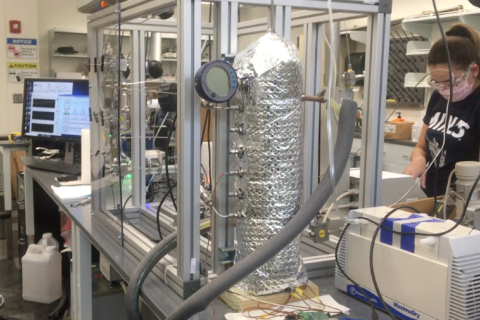Presented by:
It’s every CEO’s nightmare: an oil spill offshore California. This one stems from a pipeline leak from Beta Field. Now, ugly tar balls are washing up on the famous beaches of Orange County. Public perception of the industry takes another bad hit. As spills go, it is a relatively small one, but for the concerns it raises, it is huge.
The concerns: public opinion, the role of small-cap companies versus Big Oil and the after-effects if the Bigs divest assets to smaller-cap E&Ps.
Once again, the anti-fossil fuel crowd has been handed a gift, another powerful yet unexpected arrow for their quiver. When an incident like this happens every year or two, it cancels all the good will, good works and PR the industry has delivered during the past few years. Education is vital, but it seems to be ineffective as far as changing general public opinion to the good.
This tragic accident, a ruptured offshore oil pipeline in federal waters, was apparently not the fault of owner Amplify Energy Corp., but now the micro-cap company, with a market cap of about $130 million, is under siege from every direction and will live with the damage for years. The lawyers seeking damages are eagerly lined up, representing enviros, the state of California and dismayed investors who saw Amplify’s stock plunge.
This incident reinforces the public’s negative perception about the industry, especially about pipelines, which are already suffering from increasing opposition for a variety of reasons. Perception is everything, but alas, perception is in many ways wrong and usually obscures most of the facts. It doesn’t help matters that in the popular media, erroneous headlines blamed that old bugaboo, Big Oil.
Those of us knowledgeable about the business have a narrow definition of Big Oil; the media lumps all companies together. We in the investing world or the oil and gas industry get so wrapped up in our daily stuff that we forget most people have never heard of any oil company below the size of Chevron. What is a Devon Energy or an EOG, much less a company called Amplify?
A small company by industry standards, Amplify has about 200 employees. It owns operated and nonop interests in about 2,400 gross wells, spread widely through four plays besides offshore California’s federal waters: Oklahoma, the Rockies, Eagle Ford and Haynesville/Bossier.
The company has a bit of a checkered past that it’s been trying to rise above by paying down debt and increasing free cash flow. It was formed in 2014 through the merger of two MLPs that had exited bankruptcy, Memorial Production Partners LP and Midstates Petroleum Co.
We know that M&As and asset sales are a vital part of the industry’s ability to constantly renew itself. That is the case with Beta Field. Memorial Production Partners acquired a 51% interest in Beta in 2012 from Rise Production Partners. (The field had been discovered years ago by Shell.) In 2015 Memorial acquired most of the rest.
Due to ESG pressures today, more large E&P companies will be unloading some or all of their lower-performing assets to smaller firms to improve their emissions profile and/or returns and to focus on higher-impact projects. This makes sense and is efficient. However, who are the buyers? What are their technical strengths and financial capabilities, to monitor, prevent, respond and mitigate when accidents such as this one happen?
Amplify reported $153 million of revenue in the second quarter but lost $54 million. Production was 25,000 boe/d. During the quarter, it had recompleted a well and was doing two sidetracks at Beta Field in a bid to improve the field’s performance. The pipeline rupture was not its fault, but the stock price cratered, and litigation and controversy will now dog the company for months.
California enviros and politicians are calling for no more drilling, when in fact this incident is not caused by drilling, but then the public always confuses drilling with production and midstream operations.
But an accident is unforeseen. Amplify and other experts believe the pipeline was damaged by an anchor from a ship traveling through the area. The crowded sea lane is full of traffic, even more so than usual, as dozens of cargo ships are parked off Long Beach Harbor waiting to unload—a symbol of the global disruptions in the supply chain that we’ve heard so much about lately.
Small independents have always existed alongside the “household names” and always will. They grow by acquisition as much as by drilling. The small E&P company is a special breed, generally nimble, creative and tenacious. One can question the degree that a small-cap can use the latest high-tech artificial intelligence for preventive maintenance and real-time monitoring to identify leaks or other problems. Now, the proper response and the timely cleanup will hold the industry’s attention.
Recommended Reading
CERAWeek: Large Language Models Fuel Industry-wide Productivity
2024-03-21 - AI experts promote the generative advantage of using AI to handle busywork while people focus on innovations.
Betting on the Future: Chevron Technology Ventures’ Investment Strategy
2024-04-09 - After a quarter century, Chevron Technology Ventures seeks both incremental and breakthrough technologies with its early-stage investment program.
The Pandora's Box of AI: Regulation or Self-governance?
2024-04-04 - Experts urge policymakers to learn from the failure to rein in the internet and move quickly to regulate AI.
Going with the Flow: Universities, Operators Team on Flow Assurance Research
2024-03-05 - From Icy Waterfloods to Gas Lift Slugs, operators and researchers at Texas Tech University and the Colorado School of Mines are finding ways to optimize flow assurance, reduce costs and improve wells.
Curtiss-Wright to Deploy Subsea System at Petrobras' Campos Field
2024-02-12 - Curtiss-Wright and Petrobras will combine capabilities to deploy a subsea canned motor boosting system at a Petrobras production field in the Campos Basin.






